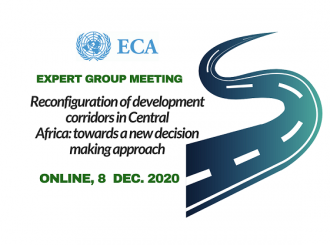
Yaounde, 4 December 2020 (ECA) – How can Central African countries reconfigure existing transport highways which interconnect them, while building and linking new ones in a way that engines and supports structurally transformative economic activities along and near these routes? This is a fundamental question the Subregional Office for Central Africa of the UN Economic Commission for Africa (ECA) and, governments and development partners within the sub-region seek to shed light on, in a forthcoming expert group meeting on the theme: “Reconfiguring development corridors in Central Africa: towards a new decision making approach.”
The exchange will be held virtually on 8 December 2020, bringing together high-level transport infrastructure development, policy and planning officials; representatives of intergovernmental bodies such as the African Union Commission, CEMAC and ECCAS; private sector leaders; development organizations; partner UN bodies; civil society members; and academics.
“At this point in time when everyone agrees with us on the need for the structural transformation of our economies with particular focus on the productivity gains that stem from vertical and horizontal economic diversification, we see development corridors as a game-changer for countries across the subregion,” said Lot Tcheeko, an ECA official coordinating efforts towards the brainstorming exercise.
“For decades, the notion of corridors in Africa in general, and in Central Africa in particular, have been solely about transport networks consisting of major roads essentially linking areas of raw material production to ports of export and linking these same ports to areas of consumption of imported finished products,” he said.
He noted that as a result of this development philosophy, the criteria that prevailed in the selection of corridors did not always include the dimension of profitability and economic potential.
Now that echoes on the need to break from the vicious circle of seeking rents for raw materials while depending almost entirely on imports for the consumption of finished products has been well understood and appropriated by both governments and peoples of the subregion, it is most relevant to make transport infrastructure count as an important factor for transformation.
The approach of transforming passage ways into development corridors means regional routes are no longer to be used solely for the transportation of goods and services, but also as a means of stimulating the social and economic development of surrounding areas. This model of development (or economic) corridors calls for more encompassing work on the deliberate creation of industrial and social infrastructure to be done whenever important routes are being configured and built.
Economists at ECA’s Office for Central Africa argue that the intelligent mapping-out of transport corridors will presuppose good spatial reviews and planning so that zones with a high potential for productivity due to their human and natural resources as well as their proximity to such routes are readied for an explosion of economic activity in areas such as mining, agribusiness, manufacturing, trade and tourism. Resource allocation and investments can be easily made once these premises are established, alongside the construction of transport pathways. This would also encourage the creation of special economic zones, which in turn, can help make up for the absence or inadequacy of essential development infrastructure.
ECA therefore thinks the time is ripe for shifting the paradigm on 'transport' corridors, particularly those identified in the Central Africa Consensual Transport Master Plan (PDCT-AC) adopted by the 11th Ordinary Conference of Heads of State and Government of the Economic Community of Central African States (ECCAS), held in Brazzaville, Congo, on 27 January 2004, and formulated with the technical support of ECA. Meanwhile the 18th ordinary session of the Conference of ECCAS Heads of State and Government held on 27 November 27 2020 called for an overhaul of the PDCT-AC programme to reflect current development needs. Priority Action Plan of the ECCAS Commission adopted recently by the 18th Conference of Heads of State and Government of ECCAS provides for the updating of the PDCT-AC
This meeting of experts will therefore generate discussions on the impact of the creation of development corridors in Central Africa, and to piece together recommendations and orientations for a reconfiguration and acceleration of the implementation of the PDCT-AC.
-ENDS-
Media Contact
Abel Akara Ticha - Communication Officer
United Nations Economic Commission for Africa
637, rue 3.069, Quartier du Lac, Yaounde, Cameroon
Tel: +237 222504348
E-mail: akara@un.org